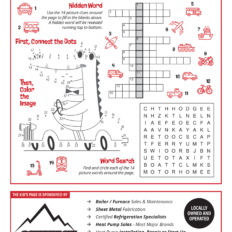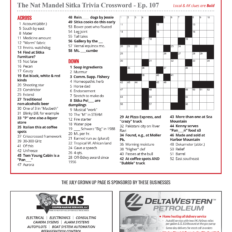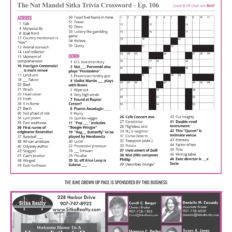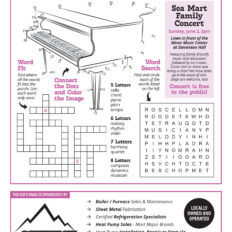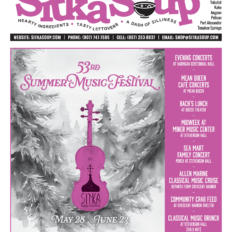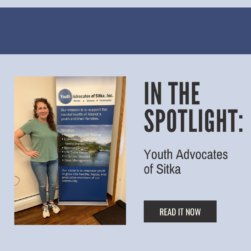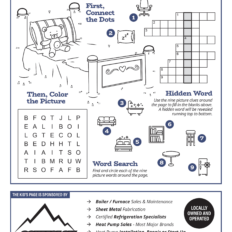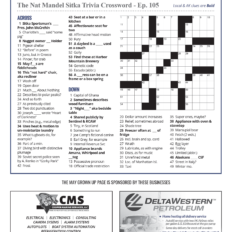In The Spotlight: Drama, Debate & Forensics
2021-22 marks the sixth year Christian Litten has coached Drama, Debate and Forensics (DDF) at Sitka High. “It’s one of the most rewarding experiences I could ever imagine,” and not unlike coaching a sports team.
2021-22 marks the sixth year Christian Litten has coached Drama, Debate and Forensics (DDF) at Sitka High. “It’s one of the most rewarding experiences I could ever imagine,” and not unlike coaching a sports team.
One of two coaches, Litten is in charge of the drama piece and overall logistics. The other coach is Amy Ainslie, who handles the forensics side of things.
 Litten himself participated in DDF in 2000-03. “Back then, SHS had classes in drama and debate, which served as feeder sources for the competitive teams.” The classes ended when that teacher left. Ainslie, says Litten, is a skilled forensics coach, having trained at University of Alaska, Anchorage, a top U.S. debate school. Only in Alaska and one other state are drama and debate bundled into the same tournaments – this set-up works in a state with longer distances and a smaller pool of students.
Litten himself participated in DDF in 2000-03. “Back then, SHS had classes in drama and debate, which served as feeder sources for the competitive teams.” The classes ended when that teacher left. Ainslie, says Litten, is a skilled forensics coach, having trained at University of Alaska, Anchorage, a top U.S. debate school. Only in Alaska and one other state are drama and debate bundled into the same tournaments – this set-up works in a state with longer distances and a smaller pool of students.
Southeast DDF has 12 events. Under “Acting” are Solo and Duet Acting, Readers’ Theater and Pantomime. “Forensics” includes Humorous and Dramatic Interpretation, Duo Interp (two people), Informative Speaking, Original Oratory (persuasive speaking), Extemporaneous Commentary and Extemporaneous Speaking. The two extemps have subtle differences. “Commentary” typically deals with shorter, lighter topics, while “Speaking” may address domestic or foreign issues, and students have just 20-30 minutes to prepare after drawing a topic.
“Public Forum Debate” is perhaps what we think of when we picture a high school debate. Two-person teams debate topics “that are accessible to the layman. These are meant to be done in front of the public, making it easier to find community judges.” PFD teams get new topics every month (unlike Policy Debate students who study one topic for the whole year). “You do not know which side you’re going to be on. Each tournament has six debates, and you have to prep for both pro and con positions, so you really have to know all sides of your topic.”
Last year, because of Covid the entire DDF program operated virtually. “Covid was very difficult. All of a sudden there’s no more ‘public speaking.’ A year of doing everything virtually. Different rules, such as ‘To make good eye contact, look directly into the camera.’ We were lucky, though. At least we got to have a season, even if bizarre one. This year we’re returning to live tournaments. Coming back has been a little struggle, but infinitely better.”
Upcoming tournaments include one in Juneau mid-November, one in Ketchikan mid-December, and a regional tournament hosted by SHS at the end of January. Finally, there’s the State Tournament in Anchorage the third week in February. The whole season has masking (except during actual debates), distancing and weekly testing. Coach Litten holds practices Tuesdays and Thursdays after school. Both he and Ainslie also put in a lot of personal time, finding and curating scripts.
“I never thought it would be something I’d even be allowed to do, but it’s a very fulfilling way of giving back to the community. I tell students, ‘You’re going to use these skills for the rest of your life.’ Every kid at the high school – there is something they can get out of DDF.”
“It was easily the most important activity I did as a student as far as shaping how I communicate, how I interact with people to this day.”
SHARE POST
Want to Submit a Listing to the Soup?
Send us a message and we'll post it online and in the next printed Soup.



